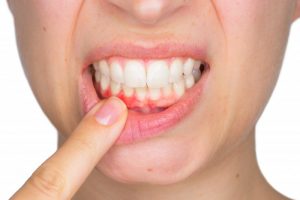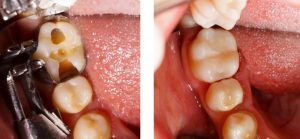 It’s very important to take care of your health when you are pregnant in order to reduce the risk of complications and to help ensure a healthy development for your growing baby. One of the most overlooked elements of pregnancy health is your teeth: it is even more important to practice great dental health when you’re pregnant due to the potential for developing problems with your teeth as your pregnancy continues. The following guide will help you learn how to protect your teeth during pregnancy.
It’s very important to take care of your health when you are pregnant in order to reduce the risk of complications and to help ensure a healthy development for your growing baby. One of the most overlooked elements of pregnancy health is your teeth: it is even more important to practice great dental health when you’re pregnant due to the potential for developing problems with your teeth as your pregnancy continues. The following guide will help you learn how to protect your teeth during pregnancy.
How Do I Protect My Teeth During Pregnancy? Here are 5 Tips
August 30, 2019
4 Steps to Improve Your Oral Health
June 24, 2019
 Taking care of your oral health is just as important as eating a nutritional diet and getting regular exercise. Proper oral hygiene can help prevent infections, gum disease and a host of other problems that will leave you worse for wear. If you want to start improving your oral health, consider the following 5 steps you need to take in order to improve your oral health today.
Taking care of your oral health is just as important as eating a nutritional diet and getting regular exercise. Proper oral hygiene can help prevent infections, gum disease and a host of other problems that will leave you worse for wear. If you want to start improving your oral health, consider the following 5 steps you need to take in order to improve your oral health today.
Top 5 Ways to Perfect my Smile Before my Upcoming Wedding
May 20, 2019
You naturally want to look your best on your wedding day—from your hair to your clothing all the way down to a perfect smile that will shine brightly and beautifully in all your wedding photos. If you want to take the extra steps to perfect your smile before your upcoming wedding, you’re in luck—there are many ways you can make sure that your smile is looking its best on your big day. The following are the top 5 ways to perfect your smile before your wedding.
(more…)
Sugar is Seriously Horrible for Your Health: 4 Reasons to Avoid the Sweet Stuff
April 26, 2019
The average person consumes anywhere from 3 to 5 times the maximum amount of sugar that health experts recommend per day—and it’s disastrous for their health. Sugar is one of the leading causes behind a host of rising health problems in the modern world, and yet it seems like we can’t escape the sticky, sweet sugar that is found in everything from candy to processed foods. If you want to know how much damage all that sugar is doing to your body, read on to find out the most significant negative impacts that consuming even just a few teaspoons of sugar a day will have on your health.
What Is Tooth Sensitivity and Why Do I Have It?
February 6, 2019

Tooth sensitivity is a problem that plagues many people. However, few people know exactly what tooth sensitivity is—and what causes them to experience sensitive teeth. If you are currently experiencing tooth sensitivity, take a look at the following guide to understanding why your teeth are sensitive, what caused it, and the next steps you need to take.
10 Reasons Why People Don’t Think They Need to See a Dentist
November 9, 2018
 Going to the dentist is not exactly the average person’s favorite past time. No one likes being poked and prodded, but going to the dentist is vital for your health. Here are 10 reasons why people don’t think they need to see a dentist, and why those reasons aren’t really valid. (more…)
Going to the dentist is not exactly the average person’s favorite past time. No one likes being poked and prodded, but going to the dentist is vital for your health. Here are 10 reasons why people don’t think they need to see a dentist, and why those reasons aren’t really valid. (more…)
Mercury-Free Dentist Discusses the Risks of Amalgam Fillings
October 20, 2018

It is unfortunate, but many dental practices around the country do not feel the need to replace silver fillings with tooth-colored alternatives. The fact is silver (amalgam) fillings are more likely to cause harm to natural tooth structure compared to composite resin, the material that our practice uses to fill damaged teeth.
The Center for Advanced Dentistry does not use metal fillings or traditional fillings of any kind for several reasons. To learn why silver fillings have more potential to cause harm, keep reading this post from a mercury-free dentist!
4 Steps to Better Oral Health During National Dental Hygiene Month
October 4, 2018

This month is National Dental Hygiene month and although most of you know how to take care of your teeth, we want to offer a few reminders so you can avoid dental disease or bad breath.
- Brush your teeth at least twice a day- Using your favorite toothpaste, you should carefully brush your teeth in the morning and before bed. Traditionally, dentists have said to sing the Happy Birthday song in your head twice to know you have brushed
long enough. We have tested this theory and have found that the “In Your Feelings” chorus works just as well (dancing is optional). Brush slowly in circular motions covering all surfaces of your teeth. - Floss Daily- This is a tough one for most people. We love the look on your faces when we ask if you floss daily and you tell us “no”. Forty percent of plaque cannot be reached with a toothbrush. Getting down in between each tooth can
remove up to 80% of the plaque growing there. It only takes a minute and can save you so much pain or discomfort later on. - Limit your sugar intake- Foods high in sugar can cause cavities or cause your teeth to decay if eaten frequently. Swap some of those sugary treats and drinks for foods rich in calcium to protect your smile.
- Come see us- Regular visits to the dentist are a very important step in dental hygiene. We recommend visiting us twice a year so that we can detect any issues in their early stages. Cavities, gum disease, or even oral cancer often do not cause pain
or discomfort until they are in an advanced stage. That makes early detection extremely important.
Following these four simple steps can protect your teeth and help ensure that they are as strong and healthy as you are.
For more tips and info, visit our website or call (216) 820-9315. Also like us on Facebook and follow us on Instagram.
where we share great information each day with our online community.
Holistic Dentist Discusses the Benefits CBD Oil Can Provide
September 15, 2018
 Holistic dentists understand that there are many safe and natural ways to take care of your oral health. A very popular compound right now known as cannabidiol (CBD) oil, is making waves online and throughout the country because of its numerous health benefits. In many cases, cannabidiol is known for its positive effects for seizure patients. However, did you know it also contains antibacterial and antifungal properties?
Holistic dentists understand that there are many safe and natural ways to take care of your oral health. A very popular compound right now known as cannabidiol (CBD) oil, is making waves online and throughout the country because of its numerous health benefits. In many cases, cannabidiol is known for its positive effects for seizure patients. However, did you know it also contains antibacterial and antifungal properties?
To learn how CBD can help those with gum disease, tooth decay and temporomandibular joint dysfunction (TMJ), keep reading!
What Causes Dental Anxiety & What are Your Options
September 6, 2018

Even the bravest of men and women can feel a little anxious when it’s time to sit in the dental chair for an exam. No one likes to feel helpless, especially when we’re supposed to sit back passively while someone explores our mouth with a pointy hook. Learning you have to undergo yet more pain in the form of a filling after a painful cavity gets stabbed with that hook just makes the visit even less pleasant.
Despite these fears however, it’s important to visit the dentist every 6 months for a cleaning and check up. Skipping these important exams can lead to more serious problems by the time you finally do sit in the dentist chair. If the thought of making an appointment with the dentist strikes fear in your heart, there are a few ways to deal with your dental anxiety.
